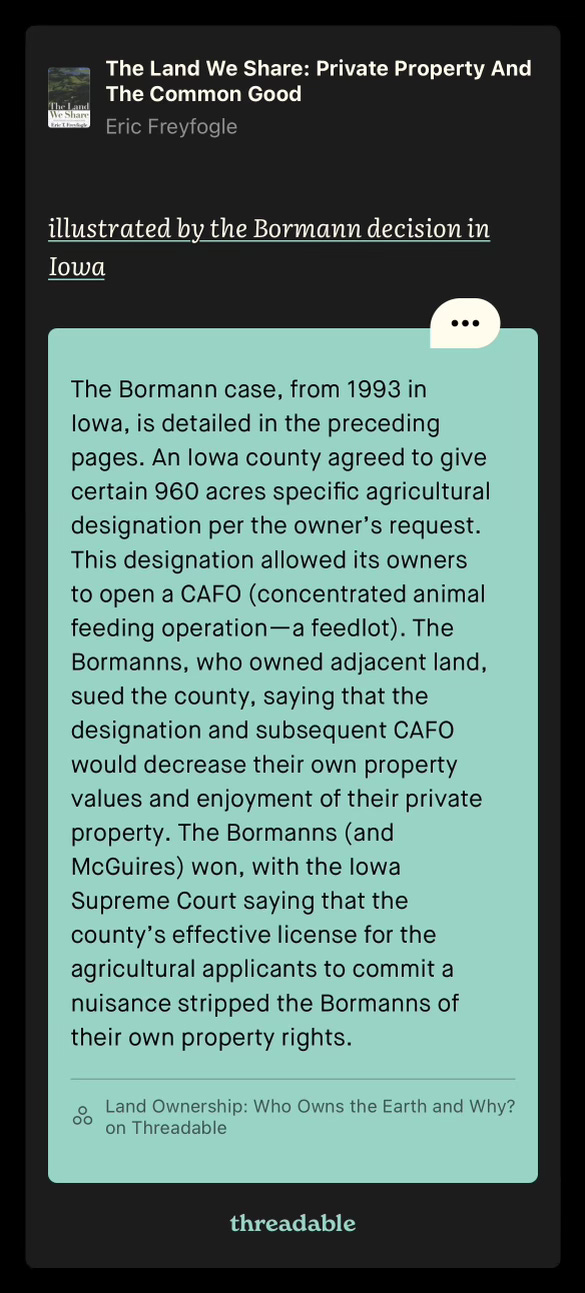Reading "The Land We Share" by Erik T. Freyfogle
Threadable-adjacent reading discussion on land ownership
Last week’s Threadable reading* was a selection from law professor Erik T. Freyfogle’s book The Land We Share: Private Property and the Common Good: pages 16 (starting after the section break at “What, then, are the fundamental elements of private property?”) through 36 (end of the chapter).
*(https://threadablenative.page.link/Rxp8yegeZ1vXy4u19 if you want to try Threadable and need the link! Only works on iOS/Apple devices for now.)
Unfortunately, I wasn’t able to find the book on archive.org, but most of the selection is on Google Books, which has pages 16-35. There’s only half a page after that and the line that I chose this selection for, which ends the chapter: “To study property law is to gain insights into society as a whole: where it has been, what it values, and where it wants to go.”
The chapter opens with a 1993 case from Iowa, but since the selection starts after that case is detailed, I gave a brief overview of it in a comment:
(The Google Books Preview has that first part of the chapter, starting on page 11, if you’d rather just read it.)
The Land We Share is a very readable set of legal cases, starting from the earliest days of the United States’ existence and tracing the evolution of private property rights. The Bormann case referenced above is a tangled culmination of our latest legal iterations, which has allowed the narrative of property rights to be framed by those who believe in absolute private property rights—as if, somehow, one’s rights to use land and resources cannot ever affect or be affected by others—and who have enshrined the idea that private profit is almost always a public good.
The Bormanns won their suit through a nuisance law approach: by their county rezoning land to allow a CAFO, it was creating a nuisance that decreased others’ property values and eroded their own rights. “Nuisance law,” wrote Freyfogle,
“enhances and protects property rights at the same time as it limits them.
To recognize this practical fact is to see why ‘absolute ownership’—viewed by some as the baseline of private property—literally makes no sense. What could absolute ownership mean when ownership necessarily includes both a right to use land and a right to complain about interferences by neighbors?”
No property ownership or property use, in other words, ever exists in a vacuum.
I often turn back to Freyfogle in part for his extensive legal scholarship on this subject, especially as it’s so accessible for a layperson; but even more for his repeated approaches to the idea of law as a story.
Property law, he states in as many ways and through as many examples as possible, reflects the values of a society at a given time. That’s why I like the quote at the end of the chapter, “To study property law is to gain insights into society as a whole: where it has been, what it values, and where it wants to go.” I really think this is true.
Some things to think about while reading:
Freyfogle has a continuous focus on balancing the rights of individual property owners with the community they exist in. To me, this fits in naturally with Elinor Ostrom’s work on commons-based land use systems and her idea of “nested” commons agreements. But there are a lot of different ways to think about this balance. Are there situations in your own community where it applies?
What kinds of arguments successfully persuade large portions of a population that land ownership rights should be, or even could be, absolute?
On the last page, Freyfogle mentions the problems posed by interpreting property rights in the abstract, instead of understanding them as tied to the ecosystems they’re located in. That is, not all rights—or uses—are appropriate for every bit of land. Are there ways that private property laws can be written and interpreted to be ecology-based, flexible according to the varied environments they’re applied to?
Trying to keep this shorter this time, so I’ll stop there! I really like this book. An environmental lawyer friend recommended it to me years ago, and it’s Freyfogle who (in Chapter 4 in this book) introduced me to Henry George’s Progress & Poverty, which has been so influential on my thinking with regards to the injustices of land ownership.





I'm going going to leave this... right here.
https://www.land-links.org/country-profile/mongolia/#1529266960764-53016d03-31cc